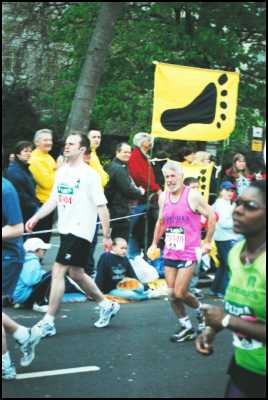NZ Man Completes London Marathon, With Parkinson's

Photo credit: Jacqueline Blanchard
By Malcolm Aitken
A Waikato man with Parkinson’s disease who completed the Flora London Marathon on Sunday says it was a dream come true and hopes it will raise awareness of Parkinson’s in New Zealand. ‘It was the best yet, I couldn’t believe it, it was sad to finish’ Derek Williamson, 65, told Scoop. ‘Everyone has heard of the London marathon. This was so special.’
Ex-pat Englishman Derek says about running 26 miles: ‘I’m a bit unsteady for the first three of four kilometres [of a marathon], my footings not the best, but after a while everything levels out.’ He gets his wife Doreen to give him a large dosage of Madopar [levodopa] before he starts long runs. The drug’s stabilizing effect lasts about three hours, Derek says.
His next goal is the New York marathon in November and there’s good reason to believe he will do it. It’s his 15th marathon since he was diagnosed with Parkinson’s eight years ago. Derek, from Koromatua south west of Hamilton, says long runs and rigorous workouts make him feel much better and he’s addicted to exercise. He usually runs, weight trains, cycles and swims for six hours a day. However, Derek concedes he mustn’t over-do things and that other people he knows with Parkinson’s don’t experience similar benefits. But his tremor diminishes and he sleeps much better while adhering to his exercise regime, he says. According to Parkinsons New Zealand’s website, along with enhancing general health and well being, exercise seems to improve the body's response to the neuro-transmitter dopamine. Levodopa-type drugs used to treat Parkinson’s raise dopamine levels, which scientists say are lacking in people with Parkinson’s.
Derek ran with the support of Parkinsons New Zealand and says New Zealand is in the early stages of public consciousness about the disease. Parkinson’s is a progressive neurological illness, which affects learned voluntary actions, making everyday activities such as talking, walking and eating difficult. The main symptoms are muscle stiffness, difficulty with making and controlling movement, slowness and a tremor. People with Parkinson’s can often freeze up when they don’t use drugs to treat it. Parkinson’s occurs when cells in the region of the brain that controls movement die. These cells produce dopamine, enabling people to perform smooth, co-ordinated movements. Why the cells die is unknown. During the past year-and-a-half there has been considerable coverage of Parkinson’s research in the British media, particularly associated with stem cell research and treatments involving replacing dead brain cells with live ones
Doreen, who’s diabetic and ran for the New Zealand Diabetics Society, always accompanies Derek on his marathons and they’re veterans of five Auckland and five Rotoroa marathons, among other achievements. Doreen has also has problems with an irregular heartbeat, Derek says. How far Derek’s come. Following his diagnosis, he says, his son Ricky and daughter Tina bought him a Sky television service and a Lazy Boy recliner and he ‘blew up to an enormous weight.’ He had always been fit and wondered what it would be like to do a marathon and before long he was putting huge effort into staying in top shape. Although he’s had every injury ‘you can imagine’ such as shin splints and a cartilage removed from his right knee, Derek says, his doctors at the Dinsdale medical centre have been very positive and ‘made me realize injuries don’t have to keep you bedridden forever.’
Derek had a special word of
thanks for his Hamilton Parkinsons field officer
Gwen
Nichols who he says was crucial to arranging his
participation in the London Marathon.
Scoop readers wanting more information about Parkinson’s disease should contact Parkinsons New Zealand’s information service on freephone 0800 4 73 4636 (0800 4 PD INFO) or parkinsonsnz@xtra.co.nz , or the national office on 04 472 2796.


 Eugene Doyle: Has WWIII Started?
Eugene Doyle: Has WWIII Started? Binoy Kampmark: Fencing The Ocean - Australia’s Social Media Safety Bill
Binoy Kampmark: Fencing The Ocean - Australia’s Social Media Safety Bill Binoy Kampmark: Trump, AUKUS And Australia’s Dim Servitors
Binoy Kampmark: Trump, AUKUS And Australia’s Dim Servitors Peter Dunne: Dunne's Weekly - The Wrong Answer To A Question That Does Not Exist
Peter Dunne: Dunne's Weekly - The Wrong Answer To A Question That Does Not Exist Martin LeFevre - Meditations: Perception, Conception And Beauty
Martin LeFevre - Meditations: Perception, Conception And Beauty Alastair Thompson: On The Publication Of The First NCQG Text 'New Collective Quantified Goal On Climate Finance'
Alastair Thompson: On The Publication Of The First NCQG Text 'New Collective Quantified Goal On Climate Finance'